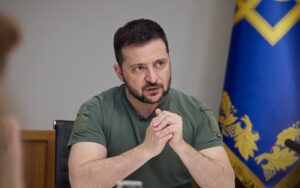
Turkish President Recep Tayyip Erdogan has said that Turkey is ready to host a peace summit with Russia.
“From the very beginning, we have been contributing to ending the war through negotiations. We are ready to host a peace summit that will include Russia,” he said on Friday in Istanbul after talks with Ukrainian President Volodymyr Zelenskyy.
Erdogan emphasized that “we support the territorial integrity, sovereignty and independence of our strategic partner, Ukraine.”
“Unfortunately, the war is having an increasingly negative impact regionally and globally, and primarily on Ukraine. No diplomatic steps have been taken to use the negotiating table we built in Istanbul in March 2022 to establish peace,” he said.
The Turkish President also expressed his readiness to support new agreements on grain exports.
According to him, “the entry into force of the free trade agreement as soon as possible will undoubtedly give impetus to the development of our relations.”
Erdogan noted that “the existence of Crimean Tatars in Ukraine is one of the most important factors in strengthening friendship between the two countries. The Crimean Tatars, who are an integral part of Ukraine, are selflessly fighting for the restoration of Ukraine’s territorial integrity.”
“In the future, on the one hand, we will stand in solidarity with Ukraine, and on the other hand, we will continue our work to end the war with a just peace based on negotiations,” he said.

During a conversation with African journalists, President of Ukraine Volodymyr Zelenskyy proposed holding a Ukraine-African Union summit and said he was ready to come to any African country for this purpose.
According to the head of state, Ukraine is interested in strategic partnership with the states of the African continent, but such a partnership should be based on mutual respect for territorial integrity, sovereignty, language and traditions.
“This should be in the cultural plane, in the economic plane, and in respect between people. Without violating your and our rights, without affecting your and our freedom. We respect any state that respects us,” he said.
As the next step in the development of strategic cooperation, Zelenskyy announced his readiness to visit any state on the African continent.
“I do not have any priorities here (regarding a particular African state – IF-U). I think that if we can organize ourselves where we can meet, so that I have maximum contact with as many leaders, as many communities as possible, I think that would be better. And I would like to have the opportunity to organize such a meeting “African Union – Ukraine” or “Ukraine – countries of the African continent,” the president said.
“To be honest, I don’t care what the format is called. The main goal is for us all to do our best to achieve stability in the world and to achieve peace on the territory of our country. And to put the question not only in Russia, but with this war and the end of this war to put in place any aggressor with any colonial ambitions for the future,” he added.
As he emphasized, this is also very important for the future, because such things, such outbreaks and such wars can happen anywhere in the world.

President of Ukraine Volodymyr Zelenskyy and President of Poland Andrzej Duda have agreed to coordinate their actions ahead of the upcoming NATO summit in Vilnius.
“At the events in Lutsk, Andrzej Duda and I had a brief but very substantive discussion about the upcoming NATO summit in Vilnius. We agreed to work together to get the best result for Ukraine,” Zelenskyy wrote on Twitter.
For his part, the Polish president also posted on Twitter: “Today in Lutsk, Ukraine, we met with Ukrainian President Volodymyr Zelenskyy to reaffirm friendship in the face of a difficult history and to hold final consultations before the NATO summit in Vilnius, which begins in two days.”
As Duda emphasized, “effective support for Ukraine in its aspirations for membership in the Alliance is very important for Poland.”

European Union leaders say they will continue to fully support Ukraine by providing political, economic, military, financial and humanitarian aid for as long as needed.
This is the case in the conclusions on Ukraine adopted at a European Council meeting Thursday in Brussels.
“The European Union firmly and fully supports Ukraine and will continue to provide strong political, economic, military, financial and humanitarian support to Ukraine and its people for as long as necessary. The European Union and member states will intensify their efforts to help meet Ukraine’s urgent military and defense needs,” the document said.
In addition, the findings state that the European Union remains committed to supporting Ukraine’s recovery and reconstruction in coordination with international partners. “In this context, the European Council reiterates the EU’s full support for the establishment of an international mechanism to record the damage caused by Russia. Together with partners, the European Union will continue to step up efforts to use frozen and immobilized Russian assets to rebuild Ukraine and to make reparations in accordance with EU law and international law,” the text said.
EU leaders also welcomed Ukraine’s commitment and efforts to implement reforms and underlined the importance of Ukraine’s accession process in line with its earlier conclusions, in particular those of June 23-24, 2022.

Ukrainian President Volodymyr Zelenskyy has held the first telephone conversation of the new year with European Commission President Ursula von der Leyen, the president’s press service has said.
“The interlocutors discussed the expected results of the next Ukraine-EU summit, which will take place in Kiev on February 3 this year, and agreed to intensify the preparatory work,” the statement said.

Ukraine-EU summit will take place on February 3, 2023 in Brussels.
Barend Leites, spokesman for European Council President Charles Michel, told the Interfax-Ukraine news agency in Brussels on Thursday.
“I can confirm that the Ukraine-EU summit will take place on February 3, there is an open invitation to President Zelensky to visit Brussels,” he said.